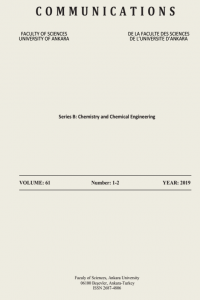Debromination of Cinnamic Acid Dibromides by Potassium lodide in 80 % Aqueous Ethyl Alcohol (a)
In the potassium iodide promoted debromination of the erytho cinnamic acid dib¬romides in 80 % aqueous ethyl alcohol at 40°, trans cinnamic acids are obtained in the satisfactory yields, which means that the reaction is a trans-stereospecific. The debromi¬nation reaction is found to be a second order, being first order in the acid dibromide and first order in the nucleophile used. The reaction rate decreases approximately two-fold as the temperature decreases from 40° to 30°. There is a small increase in the reaction as the polarity of the solvent is increased. Sodium chloride and lithium bromide exert a negative salt effect on the iodide reaction. The value of rho (p) for this reaction series is found to be -0,84 and the intercept (log k0) is equal to-2.81. The rho value is negative because electron withdrawing substituents decrease the rate of reaction whereas the elec- tron donating substituents accelerate it.
Keywords:
Debromination, Cinnamic Potassium,
___
- Communications Faculty of Sciences University of Ankara Series B Chemistry and Chemical Engineering
- ISSN: 1303-6017
- Başlangıç: 1948
- Yayıncı: Ankara Üniversitesi
